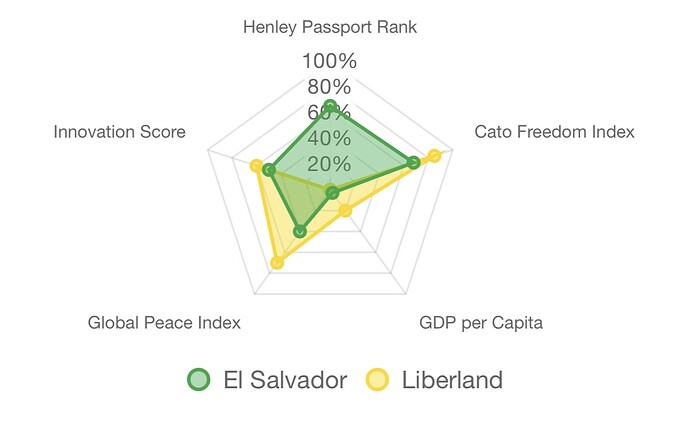Article 6 of Liberland vs The World
Liberland vs. El Salvador: El Salvador’s Bitcoin Bet Meets Liberland’s Liberland Merit/Dollar Leap
Introduction
The Free Republic of Liberland, a self-proclaimed micro-state founded in 2015 on a 7 km² disputed parcel of land along the Danube River, champions a libertarian society with blockchain-based governance and a cryptocurrency-driven economy. El Salvador, a Central American nation of ~6.5 million (World Bank, 2025), made history in 2021 by adopting Bitcoin as legal tender, positioning itself as a crypto-friendly hub. As a recognized state with bold economic reforms, El Salvador offers Liberland valuable lessons in leveraging cryptocurrency for legitimacy and global engagement. This article compares Liberland and El Salvador across Historical Origins, Culture & Society, Environment, Governance & Economy, and Diplomacy, highlighting synergies for Liberland’s growth as a crypto-centric micro-state.
Historical Origins
• Liberland: Established on April 13, 2015, by Vít Jedlička, Liberland claims terra nullius in the Siga pocket, a disputed area between Serbia and Croatia from the Yugoslav breakup. Rooted in libertarian principles inspired by Mises and Rothbard, it seeks statehood under the Montevideo Convention (permanent population, defined territory, government, international relations capacity) via a blockchain-based government, though it remains unrecognized by any UN member state.
• El Salvador: Gained independence from Spain in 1821, later navigating civil war (1980–1992) and post-conflict democratization. Its 2021 Bitcoin Law marked a global first, driven by President Nayib Bukele’s vision to modernize the economy and reduce remittance costs (20% of GDP, World Bank 2025). El Salvador’s history of overcoming instability offers Liberland a model for resilience.
• Comparison: Both entities pursue bold experiments—Liberland through its libertarian micro-state plans, El Salvador through crypto adoption. El Salvador’s path from conflict to recognized statehood provides Liberland insights into building legitimacy despite initial skepticism.
Culture & Society
• Liberland: With ~800,000 citizen applicants globally and a very small physical population, Liberland’s culture is digital, libertarian, and merit-based. Its e-residency program, inspired by Estonia, fosters a global community united by voluntaryism and blockchain innovation. Events like the Floating Man festival (per liberland.org) promote a freedom-centric identity.
• El Salvador: El Salvador’s culture blends indigenous, Spanish, and modern influences, with vibrant traditions like Fiestas Agostinas. Its young, tech-curious population (median age ~28, World Bank 2025) embraces Bitcoin, with ~30% using crypto wallets (Statista, 2025). Strong diaspora ties in the U.S. drive remittances, akin to Liberland’s global e-residency model.
• Comparison: Both foster global communities—Liberland via e-residency, El Salvador via diaspora and crypto adoption. El Salvador’s success in engaging youth with technology offers Liberland strategies to expand its e-resident base, while Liberland’s libertarian ethos could inspire El Salvador’s cultural shift toward individual freedom.
Environment
• Liberland: The 7 km² Gornja Siga pocket along the Danube features wetlands, that can be for sustainable development when done properly. My proposed plan for a Liberland Community Land Trust (CLT) with blockchain tracking aims for eco-friendly land use, avoiding land hoarding or exploitation. Proximity to Serbia’s protected Apatin wetlands necessitates low-impact environmental solutions like a run-of-river hydropower plant.
• El Salvador: Covering ~21,041 km², El Salvador’s landscape includes volcanoes, beaches, and rainforests. Environmental challenges like deforestation and coastal erosion persist, but initiatives like Bitcoin Beach promote eco-tourism. Renewable energy (50% geothermal/hydro, IRENA 2025) aligns with Liberland’s sustainability goals.
• Comparison: Both prioritize sustainable development in constrained environments. El Salvador’s renewable energy and eco-tourism models guide Liberland’s Danube-based plans, while Liberland’s blockchain-tracked CLT could enhance El Salvador’s environmental transparency.
Governance & Economy
• Liberland: Governed minimally via blockchain-based voting and hopefully by Decentralized Autonomous Organizations, another proposed plan of mine to minimize government. Liberland’s economy uses the Liberland Dollar (LLD) cryptocurrency, with no taxes and voluntary contributions. My proposed Transparency and Accountability Act that I have written about significantly would ensure market fairness, inspired by crypto-friendly policies.
• El Salvador: A presidential republic with a Cato Human Freedom Index of ~6.8 (2025), El Salvador’s economy (GDP per capita ~$5,000, World Bank 2025) relies on remittances and Bitcoin adoption. Bukele’s centralized governance has drawn criticism, but the Bitcoin Law fosters financial inclusion, with ~2 million citizens using crypto (2025).
• Comparison: Both embrace cryptocurrency, but Liberland’s decentralized blockchain governance contrasts with El Salvador’s centralized approach. El Salvador’s Bitcoin integration offers Liberland a model for mainstreaming LLM, while Liberland’s LTAA could inspire El Salvador to enhance economic transparency.
Diplomacy
• Liberland: Unrecognized by UN members, Liberland seeks informal recognition via MOUs (e.g., Somaliland) and crypto-friendly alliances, with El Salvador being a potential partner.
• El Salvador: Recognized by 193 UN members, El Salvador leverages Bitcoin to enhance diplomatic ties, notably with the U.S. and other crypto-friendly states. Its participation in ~300 multilateral treaties (UN Treaty Collection, 2025) offers Liberland a model for symbolic treaty adoptions (e.g., Vienna Convention). Bukele’s global crypto advocacy aligns with Liberland’s vision.
• Comparison: El Salvador’s crypto-driven diplomacy provides Liberland a strategy for building alliances without formal recognition. Liberland’s blockchain diplomacy could inspire El Salvador to adopt decentralized tools, strengthening its global influence.
Infographic Chart
Conclusion
El Salvador’s bold crypto experiment makes it a natural ally for Liberland’s libertarian, blockchain-driven vision. While Liberland’s unrecognized status contrasts with El Salvador’s sovereignty, their shared embrace of cryptocurrency creates opportunities for mutual learning. El Salvador’s Bitcoin adoption and diplomatic strategies can guide Liberland’s economic and legitimacy efforts, while Liberland’s decentralized governance may inspire El Salvador to explore blockchain further. By aligning on crypto innovation, Liberland can leverage El Salvador’s experience to advance its quest for a free, globally connected micro-state.
